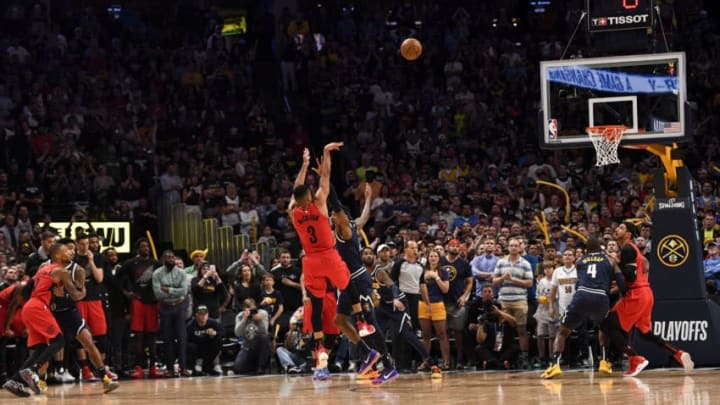After Jusuf Nurkic suffered a season-ending leg injury late in the regular season, the story about the Portland Trail Blazers had been written in permanent marker: Damian Lillard would need to carry this team. Once Portland beat Oklahoma City in the first round, that much seemed true. Box-score sheets would have to read something like they did in that series (33 points per game on 46/48/85 shooting splits) or Portland was doomed moving forward. He would need to press repeat on impossibly-angled game-winning shots and have the occasional 50-point outing against the Nuggets
One game in, the prevailing wisdom seemed correct: Lillard’s 39 points (13 in the fourth) on 12-of-21 shooting, with 11-of-13 at the free-throw line and 4-of-12 3-pointers, weren’t enough for the combined 60 points scored by the Murray-Jokic duo, who led the Nuggets to a comfortable win, 121-113.
By Game 7, though, McCollum flipped the script. Lillard scored just 13 points on 3-of-17 shooting, but his backcourt partner exploded for 37 points on 17-of-29 shooting.
Late in the fourth quarter, McCollum had a crucial “Bron-style” chase-down block (after Lillard was blocked on one end). McCollum sealed the game with a shot from the elbow. He isolated Torrey Craig, crossed-over, stopped on a dime to hit one of his eight (on 11 attempts) pull-ups from mid-range:
"I told coach ‘flatten it out and I’ll get us a bucket." - @CJMcCollum
— Portland Trail Blazers (@trailblazers) May 12, 2019
AND HE DID EXACTLY THAT. pic.twitter.com/fhm3c0zyPw
Great defense my ass
— CJ McCollum (@CJMcCollum) May 12, 2019
Whether or not McCollum should have taken a contested mid-range shot with time left on the shot-clock and teammates available sparked controversy on Twitter — including from LeBron James, who tweeted, “just get me bucket”. Whomever you sided with, though, the slow-paced and clogged-up playoffs surely bring out the best in McCollum.
His choice in that moment is reflected in his shot-profile — he is taking more 2-pointers than 3-pointers, a pattern that is continuing from the regular season. And pull-ups are a huge part of that. Of the 7.2 2-point field goals he is making per game, 3.3 are pull-ups. Fourth in percentage (44.6) for those who have taken 8 or more playoff pull-up shots per game (behind Murray, Durant, and Leonard), McCollum leverages his defender — who in “rearview pursuit”, is late to recover — and the “dropping” big man to halt and drop in a bucket:
Next, the floater is an entirely new gadget he uses to finish over taller big men. He’s taking 25 percent more floaters (5-9 feet) per game in the playoffs, yet increased his efficiency from 42.7 to 44.7 percent. Up until this stretch, the most floaters he’s taken per game is 2.5, which is much lower than his current 3.2. Second in floater percentage (44.7) for those who have taken 3 or more attempts (behind DeMar DeRozan), McCollum is able to execute a skill-move, then hit fading floaters:
However, McCollum’s 3-point shooting has been just as important to his efficient scoring, and the pull-up is often the tool that gets him free. While his spot-up ability renders him compatible with Damian Lillard, his one 3-point field goal last game shows the effectiveness of his off-the-dribble 3-point game. First, he “snaked” this pick-and-roll, but once Jokic deep-dropped, he didn’t think twice about firing a pull-up triple.
McCollum has also excelled at finishing more than ever in these playoffs. In the playoffs, he’s finishing at 50 percent in the paint (ticks below the 54 percent he posted in the regular season). Against a flat-footed, albeit quick-handed center in Jokic, McCollum beats him with an in-and-out hesitation and long stride:
Or he avoids Jokic altogether. Here, McCollum sees Jokic “hedge” early, so he crosses-over and ultimately scores a layup before Millsap can “rotate” on “help-side” quick enough:
In the pick-and-roll, McCollum’s three-level scoring ability is the area where he is a dangerous weapon for the Portland Trail Blazers. If Dame Time means isolating defenses to a pulp, CJ time is pick-and-rolling opponents to death. Despite Denver’s attempts to take the ball out of the Portland guard’s hands — in other words, forcing Rodney Hood, Mo Harkless, and Evan Turner to beat them — McCollum is capable of splitting pick-and-rolls if even a sliver of daylight presented itself:
A fiend for open space, McCollum makes up for a lack of height with low posture and elongated strides. In the screenshot below, note how McCollum maximizes space: he throws his dribble ahead, stride, and thus, forces Nikola Jokic onto his back-feet:
While Mason Plumlee is not the perimeter defender of Draymond Green, McCollum has the counters to sneak by quicker centers. Below, Plumlee slides his feet in front of McCollum’s split. McCollum whirls and no-look passes to Collins.
With the death lineup, though, the Warriors have four long-limbed defenders who can switch 1-5. Similarities can be drawn between Millsap and Green, and here McCollum easily splits Millsap’s hedge and finishes at the cup:
Even if everything goes right for McCollum, the Trail Blazers are a long shot against the Warriors. The odds are extremely high in favor of Golden State.
No, Damian Lillard doesn’t have to repeat his performance in the first-round, but Portland simply needs him to play like the All-NBA player he is. Not only that, Portland’s small forwards — Mo Harkless and Al Farouq-Aminu — can’t miss 3-pointers when McCollum or Lillard kick it to them in the corners, which they did in the first round, shooting 7-of-33 on triples. Those two points, in conjunction with McCollum playing like he did last round, could keep this series tighter than many expect.
